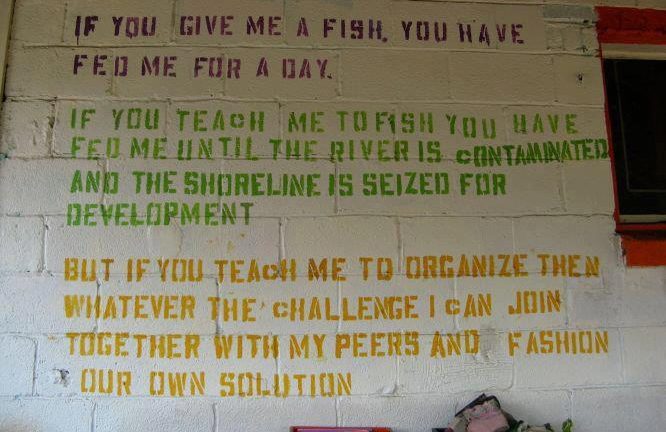
Colette Murphy is the Executive Director of the Atkinson Foundation.
I’m in Vancouver today to attend the SHARE Investor Summit with my co-worker Jenn Miller. Atkinson has been a SHARE supporter from the start — 20 years ago. It continues to be a priority to use our investor and shareholder power to help maximize public and private return on investments. We brought our first shareholder proposal on decent work to the annual meeting of Restaurant Brands International (the majority owner of Tim Hortons) last year with SHARE’s help, winning the support of 66.6% of the independent shareholders. We’ll be back again this year.
Tonight, I’ll moderate a public dialogue on a new kind of economy — one that is decarbonized and democratized. I’d say that means a fair and sustainable economy, but we’ll hear what Vancity’s Tamara Vrooman along with the BC Federation of Labour’s Chuka Ejeckam and policy researcher Seth Klein have to say this evening. They’ll discuss these big ideas with Ted Howard from the Democracy Collaborative, a long-time partner of ours.
Back in Toronto, the rest of the team is getting ready to launch a new episode in our third Just Work It podcast series on the future of work. It’s called “Lighting Up the Economy” and features Ted. In this episode, he makes the case for tough systems change work in response to growing income and wealth inequality — and issues like the ones we heard Senator Frances Lankin raise in the Senate of Canada last night. The Senator, along with several colleagues, has called for a study on the future of workers to shed more light on the darker corners of the economy.
Today is not unlike the thousands of days we’ve had since we turned from the problem of poverty toward the solution of decent work in 2014. What has become a higher strategic priority since then, however, is uncovering and questioning the deep narratives that make this philanthropic work even necessary.
Take the story of the man and the fish. We all know the version that makes the case for skilled workers. At the start of this new decade, the version above — the one told by an unknown artist in an unnamed community — rings even more true. It reveals the limits of the well-known version and makes the case for engaged workers in creating a fair and sustainable economy. This story, told from a very different perspective, has the potential to produce different outcomes for everyone who lives on this rapidly warming planet, especially those whose voices are rarely heard.
The day-to-day challenges of fighting fires lit by people who have a lot invested in the status quo makes it difficult to listen carefully, and to stay focused for the length of time needed to crack these narrative codes. In a democratic system like ours, there’s more pressure on citizens to develop the art of public speaking than public listening. That said, this is the work we recognize as our privilege and responsibility to do. We know we don’t do it alone.
More than 100 decent work activists and advocates met up in Montréal last year — the wartime home of the International Labour Organization. We marked the ILO’s 100th anniversary together, and used this occasion to wrestle aloud with the narratives we’re up against — such as:
- The economy is made up of immutable forces we can’t control or even fully understand without specialized training; the best we can do is adapt and try to cope. Poverty is an individual failing: some people fail to adapt and cope.
- Capital is for highly specialized experts. Workers have no place in deciding how to use their deferred wages and retirement savings – they should leave it to professionals to maximize their returns.
- Environmental protection is at odds with job creation. We can’t get good enough returns without exploiting workers, the environment, or both.
- Society is a contest of self-interested parties. Politicians, civil servants, businesses, unions, and ordinary people are all in it for themselves, not to be trusted. Freedom is freedom from obligation to others; we belong on our own and should look out for ourselves.
NY Times columnist Paul Krugman calls them “zombie ideas” — ideas that should have been killed by evidence, but just keep lurching along and delivering the same results. You can expect to hear more from the Atkinson Fellow on the Future of Workers, Armine Yalnizyan, this year. Armine is a skilful and fearless narrative zombie killer! She’ll be talking about maximizing the potential of Canada’s workforce instead of minimizing their wages, value and views in a time of slow economic growth.
Environmentalist Wendell Berry reminds us that “the only possible guarantee of the future is responsible behaviour in the present.” So, you can expect to see us in the places and arenas where people are finding and using their voices for narrative and systems change related to work, workers and the economy this year. I joined the founding advisory board of the FutureSkills Centre recently, and serve on the advisory group for the Inclusive Local Economic Opportunities Initiative led by the United Way Greater Toronto and BMO. Just two of the places where you’ll find us putting what we’re learning into action.
If you’re not already following us on social media, please do. That’s the easiest way to keep up on a day-to-day basis. We’d love to know what you want to know about Atkinson, and how frequently you’d like to hear from me. You’ll receive a survey soon — a tool to help us listen and learn more about you and your interests. Your input is invaluable in planning future communications and engagement activities.
In the meantime, thank you for your continued interest and support.
